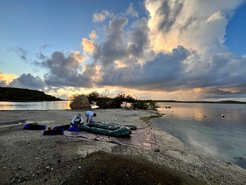PYRUS (Paraguayan Research on Urbanization and Sustainability)

The PYRUS Project investigates how human societies have transformed and adapted to environmental change in Paraguay over the long term. Prior to European colonization, the region around Asunción was inhabited by the Guaraní, who practiced agroforestry and cultural burning to manage landscapes. The arrival of the Spanish in 1537 introduced colonial agricultural systems, livestock grazing, and extensive cotton production, reshaping local ecosystems. Subsequent urbanisation, industrialization, and infrastructure expansion further altered land use and hydrological systems, contributing to contemporary environmental challenges such as deforestation, sedimentation, and waterway modification.
This project will analyse sediment cores from Lago Ypacaraí and surrounding wetlands to reconstruct past land-use patterns, biodiversity shifts, and urbanization dynamics. Palaeoecological proxies, including pollen, charcoal, and geochemical indicators, will provide insights into key socio-environmental transitions, from pre-Columbian Indigenous land management to modern industrial impacts. These findings will contribute to discussions on Paraguay’s environmental resilience and inform sustainable land-use strategies.












